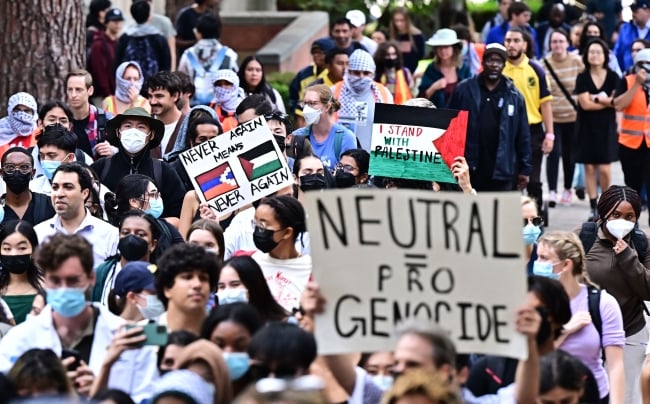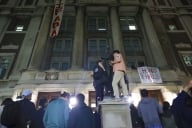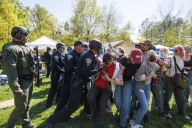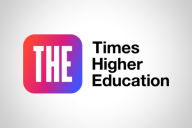You have /5 articles left.
Sign up for a free account or log in.

UCLA students participating in a Walkout to Fight Genocide and Free Palestine in October.
Frederic J. Brown/AFP/Getty Images
A group of at least 150 faculty members in the University of California system recently signed an open letter to the system’s president asking him to rescind plans to start educational programs that teach “viewpoint-neutral” Middle East history as part of a wider strategy to address antisemitism and Islamophobia on campuses in light of the Israel-Hamas war.
Dr. Michael V. Drake, president of the UC system, said at a Nov. 15 Board of Regents meeting that people within and outside the system have expressed “anger, fear, frustration, horror and sadness about how they see this conflict playing out on our campuses” as tensions among students, staff and faculty members on opposing sides of the conflict continue to escalate.
Dr. Drake announced a series of initiatives to address the problem, including a $2 million investment in educational programs on UC campuses “focused on better understanding antisemitism and Islamophobia, how to recognize and combat extremism, and a viewpoint-neutral history of the Middle East.” Another $2 million will go toward offering guidance to university leaders and educators to ensure they’re “equipped with the knowledge they need to respond when issues arise” related to the conflict and “that our university policies are supportive, preventative and viewpoint-neutral.”
Faculty members in history, humanities and social science disciplines, representing nine UC campuses—but just a fraction of the 25,000 professors systemwide—signed the letter taking issue with the term “viewpoint-neutral.” They said the wording echoes legal terminology used to prevent government agencies from discriminating against certain views under the First Amendment. They argued that “presenting conflicting viewpoints” is an important part of a history education and that scholars should be making teaching decisions without administrative interference. They also said Dr. Drake’s comments undeservedly called into question the “academic integrity” of UC professors already teaching about the Middle East.
“We insist … that professional historians and those in allied fields trained in the study of the Middle East are best-positioned to determine the curriculum, safeguard rigorous standards of research and teaching, and protect the climate of open discussion and critical inquiry which are the cornerstones of our scholarly community,” the letter read.
A statement from the UC Office of the President, shared by a spokesperson via email, said that the system “remains deeply committed to shared governance and the academic freedom of our faculty.”
“The president’s remarks were referencing voluntary educational programming on our campuses, not classroom content or curriculum,” the statement read. “We are actively working with our campuses to determine how to distribute these funds in ways that will benefit our campus communities.”
Sherene Seikaly, an associate professor of history and director of the Center for Middle East Studies at UC Santa Barbara, said the statement doesn’t alleviate her worries. She believes Dr. Drake’s decision to announce new Middle East history programming without consulting the system’s Middle East scholars undermines their authority over the teaching of these subjects and fails to acknowledge the expertise professors like her developed over decades.
“It’s like, pick up the phone and talk to the people who know the most about this who all work for you,” said Seikaly, one of the drafters of the letter and the daughter of Palestinian refugees.
James Steintrager, chair of the systemwide Academic Senate, said his ears also “perked up” when he heard the term “viewpoint-neutral,” but he was unclear about what Dr. Drake meant by the term or what additional educational programming would entail.
“I don’t think it’s that unusual for the administration to mark out topics of interest for the campus and provide some funding to create programs,” he said. He said he would just want that programming to “maximally involve the faculty.”
He added that Dr. Drake had “good intentions,” including improving campus climate and increasing understanding of Middle East history, but the president used some terms “meant to be innocent or even helpful that have raised concerns. I hope that the good intentions can be both recognized and salvaged, but certainly in a way that satisfies my colleagues that academic freedom is safeguarded and that disciplinary expertise has been respected.”
‘Viewpoint-Neutral’ History
Mark LeVine, a history professor and director of the Global Middle East Studies program at UC Irvine, believes teaching history in a “viewpoint-neutral” way is “literally impossible.” He said the concept harkens back to a “19th-century idea of objective history” disfavored by historians for “decades and decades.”
Scholarship is “based entirely on developing a point of view based on evidence and your research and your qualifications and arguing it,” said LeVine, one of the drafters of the letter. Professors should be sharing their perspectives, and “if that understanding is critical of any particular ideology—it could be Zionism, it could be capitalism, it could be communism, it doesn’t matter—you go with your research. That’s why we’ve been hired by UC.”
He added that no student should ever feel physically unsafe in the classroom.
But “the university is not a space of comfort,” he said. “The university is a space where every premise you’ve ever had in your life should be torn down and you have to be forced to recreate it based on all the new things you learn,” whether that process strengthens or changes a student’s original positions.
He and other drafters of the letter believe that the funds Dr. Drake announced could be better spent on other kinds of educational resources related to the Middle East. For example, he noted that UC Irvine could use more funding for Hebrew and Arabic language classes.
Seikaly said she tells students that she’s the daughter of Palestinian refugees, a scholar of the conflict and “also a product of it.” But she also works hard to create a classroom environment “that’s both brave and safe for people to have opposing viewpoints.”
She said she also signed a letter in October that accuses UC system leaders of maintaining “a stony silence with regard to the extreme violence perpetrated by the Israeli state against Palestinian civilians” after UC officials released an Oct. 9 statement condemning the Hamas attacks in Israel. The statement also mentioned “warfare now underway in Gaza” and grief for “all innocent people affected by this ongoing conflict,” but she felt it fell short of the same kind of full-throated condemnation of Israeli civilian deaths.
She said she doesn’t trust that “viewpoint-neutral” actually means neutral.
“I’d ask, whose viewpoint are you neutralizing, and on behalf of who?” she said.
Muriam Haleh Davis, a drafter of the letter and an associate professor of history at UC Santa Cruz whose research focuses on North Africa, said teaching history requires presenting diverse viewpoints, but that’s different from lacking a viewpoint.
“The first thing I teach my students is that everybody has a perspective that has to do with what documents you’re reading, what framework you’re using, what concerns and questions you’re asking,” she said. “The notion of history and the craft of history is that there are many viewpoints on things and we have a methodology and a way of studying those differences,” including digging into archival materials and reading the works of past historians. To her, Dr. Drake’s remarks implied “we don’t know what it is to integrate multiple viewpoints,” which she found “condescending.”
James Grossman, executive director of the American Historical Association, a professional organization for historians, similarly noted “the imperative to read a range of sources and consider historical developments from a variety of angles.” But at the same time, he doesn’t believe “all narratives are equally compelling. Evidence matters,” he wrote in an email.
He highlighted the association’s Statement on Standards and Professional Conduct, which says “practicing history with integrity does not mean having no point of view.”
Historians “understand that all knowledge is situated in time and place, that all interpretations express a point of view, and that no mortal mind can ever aspire to omniscience,” the statement reads. Simultaneously, history involves seeking to understand people from the past who “held views of their lives that were often very different from each other—and from our own. Doing justice to those views means to some extent trying (never wholly successfully) to see their worlds through their eyes,” which is “especially true when people in the past disagreed or came into conflict with each other.”
Dov Waxman, Rosalinde and Arthur Gilbert Foundation Chair in Israel Studies and director of the Younes & Soraya Nazarian Center for Israel Studies at UCLA, said “viewpoint-neutral” is an “awkward term” that rang understandable alarm bells for scholars.
But “I think when it comes to teaching in the classroom, it is important that professors allow for multiple viewpoints and don’t penalize students for having particular perspectives,” Waxman said, adding that he suspects that’s what Dr. Drake might have meant by neutrality, and if so, he agrees.
He believes professors should try to keep their opinions and politics private in the classroom, even though he agrees “perfect objectivity” is impossible. He said it’s valuable for “professors to not just teach from their own perspective and ignore other viewpoints, especially other viewpoints of academics or other experts.” He also noted there’s a “power differential” between professors and students, so students are less likely to share perspectives they think are at odds with a professor’s.
“I’m often happy at the end of the course when students tell me they don’t know what I thought,” Waxman said.
He believes additional Middle East history programming—developed in partnership with and featuring current scholars on campuses—would be helpful to students who are curious about the conflict but don’t have room in their schedules for relevant courses.
Waxman said the letter was an “overreaction,” though an “understandable” one at a time when tensions are high and lawmakers in Florida and other states have passed laws limiting how professors can teach other topics, such as African American history and gender studies.
Recent attacks on academic freedom in other states were top of mind for scholars who drafted the letter, and some expressed fears that “viewpoint neutrality” could be applied to other fraught topics as well.
“We tend to think of California as a kind of liberal bubble, and that what happens in Florida or other states will never happen here,” Davis, of UC Santa Cruz, said. But “we should think about the role of higher education and the kind of language that even liberals can use to make those of us who work at universities feel that we do not exercise freedom to think and teach and research sensitive topics.”









